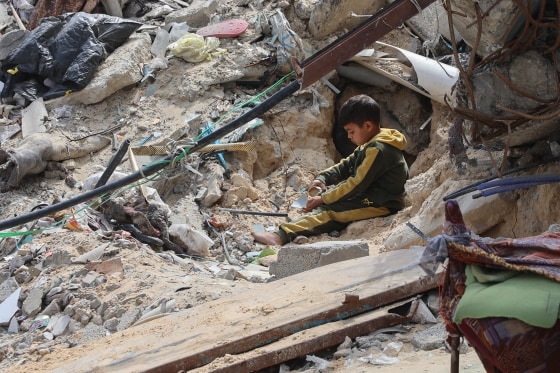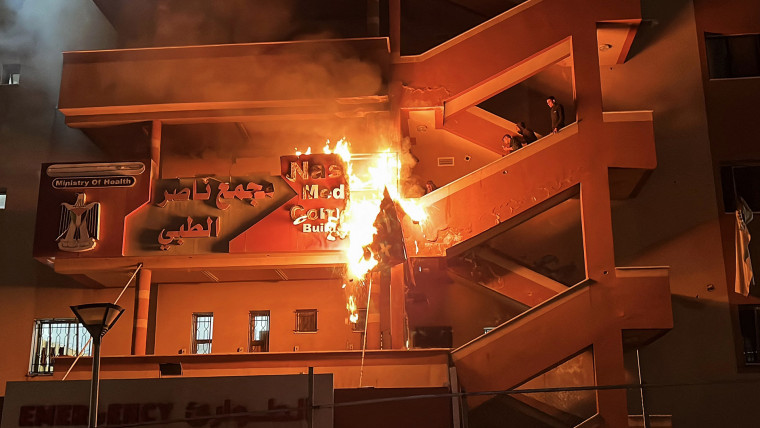No food or supplies have entered Gaza in over three weeks in the longest stretch yet without aid entering the enclave, the United Nations agency for Palestinian refugees said Friday, as Israel intensifies its military operations amid the crushing near-complete blockade, plunging the Gaza Strip into deeper desperation.
“Critical supplies, including food and medical equipment, are severely depleted and urgently needed to address the already catastrophic humanitarian crisis,” said an UNRWA report published Friday.
The World Food Programme said in an operational update Thursday that it only had enough food stocks to last another two weeks, “if supplies are stretched.”
“Hundreds of thousands of people in Gaza are again at risk of severe hunger and malnutrition as humanitarian food stocks in the Strip dwindle and borders remain closed to aid,” the WFP said.
The UNRWA report noted that on March 18, after Israel broke its ceasefire with Hamas with intense airstrikes, over 180 children were killed in single day, which UNICEF called “one of the largest single-day child death tolls in the last year.”
The death toll since the current conflict began on Oct. 7, 2023, has since surpassed 50,000, according to health authorities.
On Friday evening, an Israeli missile struck the Awad family home in Al-Zaytoun, east of Gaza City, killing 15 people, including seven women and five children, two of them toddlers.
An NBC News team captured the moment Atef Awad, a surviving family member, waited for rescuers to pull the bodies of his loved ones from the rubble.
“This is Abdullah, 14 years old, and this is Najwa, just 2 years old,” he said. “The world celebrates the birthdays of its children, and we celebrate their deaths.”
The Israel Defense Forces did not immediately respond to a request for comment.
While some grieve as their families are pulled from the wreckage, others search hospitals for missing loved ones. Inside Al-Ahli Baptist Hospital in Gaza City, Daoud Awad lifted the shrouds of the dead, searching desperately for the bodies of his loved ones.
“Where is my daughter? Where is my son?” he called out, his voice cracking as he searched.
Abdullah Al-Majdalawi, a firefighter and rescue worker, described the immense challenges his team faces in retrieving bodies, citing the severe lack of equipment and resources.
His story underscores the struggles faced by aid workers in the enclave, who put their lives at risk to help survivors.
The Palestine Red Crescent Society reported Saturday that for the seventh consecutive day, the fate of nine emergency medics remains unknown after they were “besieged and targeted by Israeli forces” in Rafah.
The PRCS also said Israeli authorities refused to allow rescue teams into the Tel al-Sultan area to search for the missing medics, calling on the international community to pressure Israel to “reveal the fate of the missing teams.”
UNRWA also reported that four staffers had been injured by Israeli strikes in March, and that several distribution centers in Gaza had suffered damage.
According to the local Health Ministry in Gaza, more than 50,000 people, including thousands of children, have been killed in Israel’s ongoing offensive.
Israel has stated its aim is to eliminate Hamas to prevent a repeat of the Oct. 7 attacks, in which 1,200 people were killed and around 250 others were taken hostage, according to Israeli officials.
Since breaking the ceasefire, Israel’s rhetoric has become increasingly hostile, with Prime Minister Benjamin Netanyahu promising increasing military strength in its assault on Gaza, and threatening to take the land.
Israel’s aggression aligns with the United States’ more combative stance against Hamas and Gaza, with President Donald Trump threatening “the People of Gaza” earlier in March that if they continued to hold Israeli hostages, “you are DEAD!”

